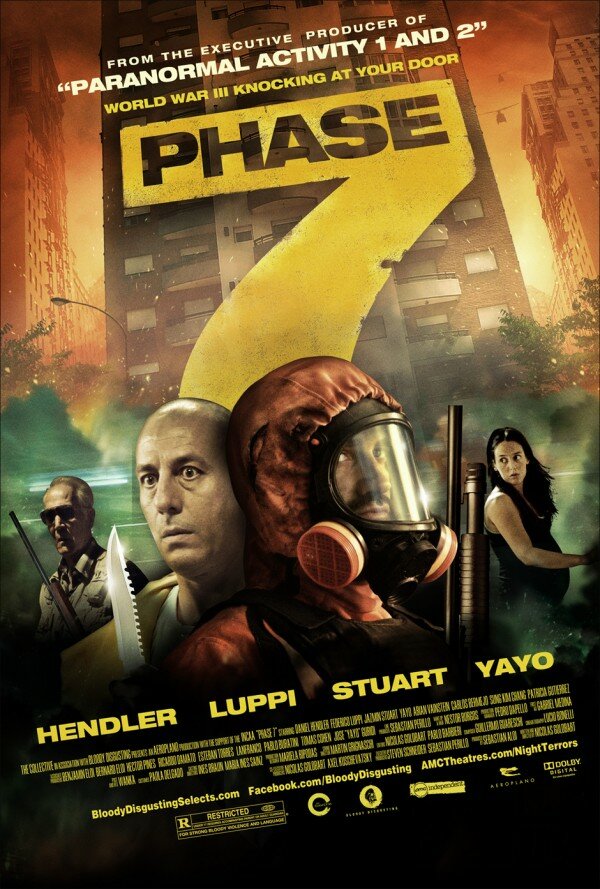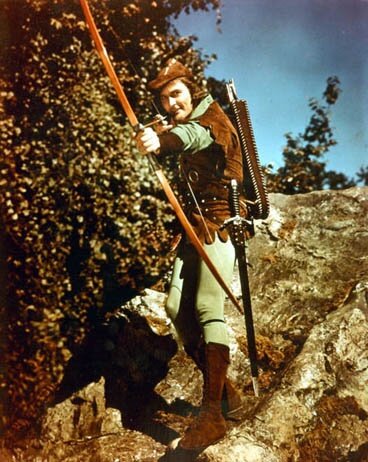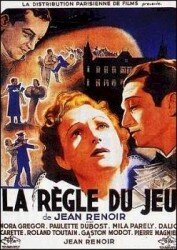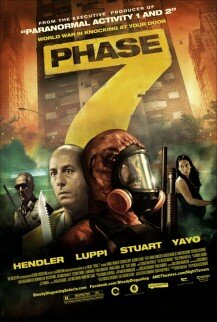 Even horror and exploitation movies–once immune to the petty shifts in economic and social climes–are taking it in the metaphoric shorts nowadays. I blame a combination of the crummy economy, and a paucity of product worth a damn.
Even horror and exploitation movies–once immune to the petty shifts in economic and social climes–are taking it in the metaphoric shorts nowadays. I blame a combination of the crummy economy, and a paucity of product worth a damn.
Happily, three local theaters are offering prime cuts of bizarre cinema this weekend, and if you’re in the mood for a strange cinematic cocktail during these summer days, seek the enclosed recommendations out.
One of these theaters, amazingly enough, is AMC’s Pacific Place Cinema in the heart of downtown Seattle. But sure enough, amidst the salvo of tentpole superhero epics and chick flicks inhabiting said multiplex is Phase 7, an odd–and very entertaining–hybrid of disease-fear horror and jet-black humor. It screens at midnight tonight, 10 p.m. on Wednesday July 20, and once more at midnight next Friday, July 22nd.
Daniel Hendler and Jazmin Stuart play Coco and Pipi, a young married couple living in a new apartment with a typically goofy gaggle of neighbors. Early on, a pandemic–earmarked by paranoia, violent behavior, and icky mucous-laden death–throws all of Buenos Aires into abject chaos. The couple’s building winds up in government quarantine, and Coco finds himself reluctantly aligning with his complex’s most ostensibly paranoid survivalist neighbor Horacio (Yayo Guridi) as any semblance of social order flushes down the crapper.
Entertainment upstarts The Collective and top horror-movie website Bloody-Disgusting.com are distributing Phase 7 to AMC theaters around the country for a limited run, and it’s definitely too unusual for mainstream palates. It straddles a line that would likely doom it in a larger release: The movie’s subtitled, too gruesome for the Kate-Hudson-meet-cute set, yet too subtle and slow-burning for the teenage ADHD audiences targeted by most horror filmmakers. But it’s a funny and suspenseful shaggy dog of a view.
Promotional materials compare it to Shaun of the Dead and the Spanish cult horror flick, [rec]; both valid reference points. Hendler’s layabout hero Coco is a Latin kin to Simon Pegg’s slacker zombie-killer, and Phase 7 somehow steers [rec]’s realm of disease fear into a really warped comedy of manners. There’s a great comedic chemistry between Guridi’s stolid machismo and Hendler’s lazy charm, and Pan’s Labyrinth character actor Federico Luppi pops up, hilariously, as the building’s most charming and eccentric old duffer. I don’t know how it’ll play with a more general audience, but in its own offhand way Phase 7 offers belly laughs as deep as Shaun of the Dead if you’re in the right (wrong?) frame of mind.
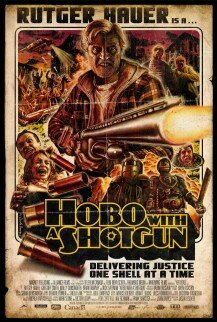 Hobo with a Shotgun, by contrast, serves up a concept so high-concept (title tells all, folks) that it’d take a frontal lobotomy not to get it. The unimpeachably awesome Rutger Hauer assays the title role; playing an embittered and nameless homeless gent who rids the streets of pedophiles, hoodlums, and other miscellaneous scumbags. Yours Truly hasn’t yet seen this open love letter to that venerated exploitation sub-genre, the Death Wish-style revenge flick. But the trailer (and reviews so far) promise the kind of sublime balance between yocks and heartfelt homage that made Black Dynamite a SIFF 2009 Golden Space Needle winner. Hobo with a Shotgun begins a run at everyone’s favorite food-and-film stop, the Central Cinema, tonight, July 15.
Hobo with a Shotgun, by contrast, serves up a concept so high-concept (title tells all, folks) that it’d take a frontal lobotomy not to get it. The unimpeachably awesome Rutger Hauer assays the title role; playing an embittered and nameless homeless gent who rids the streets of pedophiles, hoodlums, and other miscellaneous scumbags. Yours Truly hasn’t yet seen this open love letter to that venerated exploitation sub-genre, the Death Wish-style revenge flick. But the trailer (and reviews so far) promise the kind of sublime balance between yocks and heartfelt homage that made Black Dynamite a SIFF 2009 Golden Space Needle winner. Hobo with a Shotgun begins a run at everyone’s favorite food-and-film stop, the Central Cinema, tonight, July 15.
If you want to see a satisfying example of vintage exploitation, though, get thee to the Grand Illusion this weekend and/or next for their late show. The U-District theater is screening Tourist Trap, a 1979 horror flick that stands as one of that decade’s overlooked gems.
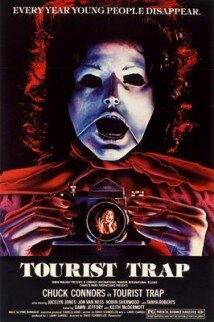 Former western hero Chuck Connors plays a kindly old guy who runs a dilapidated wax museum off the beaten path. A group of reckless teenagers stumbles into this odd place; and much psychokinetic mayhem ensues. Tourist Trap overcomes its formulaic pedigree (think Carrie uneasily meeting The Texas Chainsaw Massacre) with disorienting and taut direction by David Schmoeller, a patina of gritty menace steeped in its decade of origin, and some of the most unsettling mannequins you’ll ever see committed to film.
Former western hero Chuck Connors plays a kindly old guy who runs a dilapidated wax museum off the beaten path. A group of reckless teenagers stumbles into this odd place; and much psychokinetic mayhem ensues. Tourist Trap overcomes its formulaic pedigree (think Carrie uneasily meeting The Texas Chainsaw Massacre) with disorienting and taut direction by David Schmoeller, a patina of gritty menace steeped in its decade of origin, and some of the most unsettling mannequins you’ll ever see committed to film.
It scared the willies outta me as a wee lad back in the day, and the movie’s small but fervent cult includes none other than Stephen King (who loudly sings the film’s praises in his book, Danse Macabre). If that’s not the most resounding of endorsements, you’ve stumbled into the wrong SunBreak B-movie evangelist’s post by mistake, Bucky.
